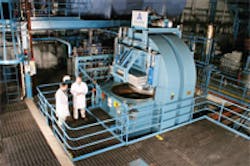Worlds Largest Hot Isostatic Press Again
Avure Technologies, Inc. recently delivered a high-capacity hot isostatic press (HIP) to Bodycote’s Northwest regional service center in Camas, WA. The new system, which was commissioned late last year, is equal in size to a HIP installed in Camas in 1998, and both units rank as the largest such presses ever built. Hot isostatic pressing is a process manufacturers use to reduce porosity in cast metal components to improve their performance in various applications.
Bodycote (www.bodycote.com) claims to be the world’s largest supplier of testing and thermal processing services, with more than 300 service facilities in 30 countries. Avure Technologies (www.avure.com) specializes in design, manufacturing, installation, and global support of high-pressure presses for densification of advanced materials and critical industrial parts.
According to Bodycote, removing shrinkage defects, and other pores and voids as potential initiators of failure, exerts a considerable positive effect upon component properties. Low- and high-cycle fatigue and stress rupture properties are enhanced. HIP treatment may also provide improved homogeneity of the cast structure, with the result that chemical machining and corrosion susceptibilities are improved.
The process, which is also known as densification, subjects a component to elevated temperature as well as to isostatic gas pressure in a high-pressure containment vessel. Isostatic pressure means that the pressure is transmitted equally in all directions. An inert gas is used so that the material does not chemically react during processing. Argon is the pressurizing gas most widely used in the process.
During processing, the component is sealed in the HIP chamber and the chamber is heated, causing the pressure inside the vessel to increase. Applying heat and pressure simultaneously during processing eliminates any internal voids and microporosity in the component through a combination of plastic deformation, creep, and diffusion bonding.
The work zones of the ultra-large Bodycote presses measure 66 in. in diameter and 100 in. long, and can produce operating pressures up to 15,000 psi and temperatures of 2,300ºF to densify and eliminate internal porosity in a wide variety of industrial components.
The newest HIP was designed, manufactured, tested, and installed at Camas over a period of 21 months.
The Camas facility, part of Bodycote’s Thermal Processing Group, primarily processes commercial and aerospace castings made from titanium, nickel, cobalt, ironbase superalloys, aluminum, and steel. The use of ultra-large HIPs enables Bodycote’s customers to outsource the densification and strengthening of their parts in shared space at low cost per pound, with no minimum lot size.
Ed Tenerini, Bodycote’s president of North American HIP and director of European HIP, says, “Avure offered the best delivery time and most cost effective solution for expansion of our Camas facility and global HIP network, which includes over 20 HIP systems from Avure. The opportunity to duplicate an Avure system already in place in Camas allows us to reduce our inventory of spare parts, utilize tooling and furnaces in either unit and facilitates training of personnel.”
Avure’s president and CEO, Pat Adams, adds that Bodycote’s HIP operation at Camas “is one of the most advanced facilities in the world. We are pleased to have contributed to its success.”
